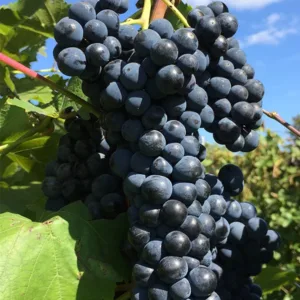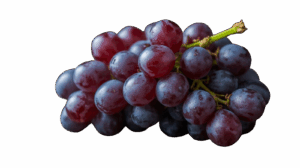Marquette Grapes
Marquette grapes are a dark red to nearly black hybrid variety prized for producing high-quality red wines with complex flavors. Here are some key details about them:
General Characteristics
-
Type: Interspecific hybrid (descendant of Pinot Noir crossed with other cold-hardy grapes).
-
Origin: Developed at the University of Minnesota and released in 2006.
-
Flavor: Rich, complex, with notes of cherry, blackberry, black pepper, and spice. Wines often show subtle tannins and good acidity.
-
Seeds: Yes, they are seeded.
-
Use: Primarily winemaking, especially dry to semi-dry red wines.
Growth & Harvest
-
Ripening: Mid-season, typically around mid-September (earlier than many vinifera reds).
-
Vine: Moderately vigorous, productive, with good disease resistance.
-
Clusters: Medium-sized with small berries.
-
Cold Hardiness: Extremely hardy, tolerating temperatures down to –36°F (–38°C), making it one of the most reliable red wine grapes for northern regions.


Advantages
-
Outstanding cold hardiness for extreme northern climates.
-
Produces complex, high-quality red wines often compared to cool-climate Pinot Noir styles.
-
Good disease resistance (especially to downy mildew and powdery mildew).
-
Earlier ripening than many classic red varieties, suitable for shorter growing seasons.
Disadvantages
-
Seeded (not ideal for table grape eating).
-
Still relatively new, so less recognized in mainstream wine markets.
-
Requires careful vineyard management to balance acidity and tannins in wine.
If you’re seeking a cold-hardy red grape capable of producing elegant, complex wines in northern climates, Marquette is a top choice and a cornerstone variety for emerging cool-climate wine regions.
